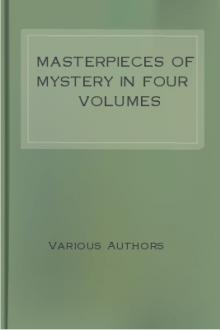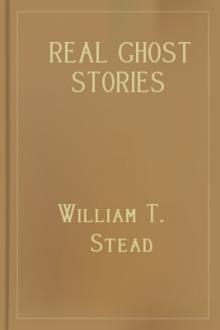Varney the Vampire; Or, the Feast of Blood by Prest and Rymer (ereader iphone .txt) 📗

- Author: Prest and Rymer
Book online «Varney the Vampire; Or, the Feast of Blood by Prest and Rymer (ereader iphone .txt) 📗». Author Prest and Rymer
It was a very vexatious thing, too, for any one to come there at such a juncture, perhaps only from motives of curiosity, or possibly just to endeavour to commit some petty depredations upon the deserted building, if possible; and most heartily did the doctor wish that, in some way, he could scare away the intruder.
The man walked along very slowly, indeed, and seemed to be quite taking his time in making his observations of the building; and this was the more provoking, as it was getting late, and if having projected a visit at all, it would surely soon be made, and then, when he found any one there, of course, he would go.
Amazed beyond expression, the doctor felt about on the ground at his feet, until he found a tolerably large stone, which he threw at the stranger with so good an aim, that it hit him a smart blow on the back, which must have been anything but a pleasant surprise.
That it was a surprise, and that, too, a most complete one, was evident from the start which the man gave, and then he uttered a furious oath, and rubbed his back, as he glanced about him to endeavour to ascertain from whence the missile had come.
"I'll try him again with that," thought the doctor; "it may succeed in scaring him away;" and he stooped to watch for another stone.
It was well that he did so at that precise moment; for, before he rose again, he heard the sharp report of a pistol, and a crashing sound among some of the old wood work of which the summer-house was composed, told him that a shot had there taken effect. Affairs were now getting much too serious; and, accordingly, Dr. Chillingworth thought that, rather than stay there to be made a target of, he would face the intruder.
"Hold—hold!" he cried. "Who are you, and what do you mean by that?"—"Oh! somebody is there," cried the man, as he advanced. "My friend, whoever you are, you were very foolish to throw a stone at me."
"And, my friend, whoever you are," responded the doctor, "you were very spiteful to fire a pistol bullet at me in consequence."—
"Not at all."
"But I say yes; for, probably, I can prove a right to be here, which you cannot."—"Ah!" said the stranger, "that voice—why—you are Dr. Chillingworth?"
"I am; but I don't know you," said the doctor, as he emerged now from the summer-house, and confronted the stranger who was within a few paces of the entrance to it. Then he started, as he added,—
"Yes, I do know you, though. How, in the name of Heaven, came you here, and what purpose have you in so coming?"
"What purpose have you? Since we met at Varney's, I have been making some inquiries about this neighbourhood, and learn strange things."—"That you may very easily do here; and, what is more extraordinary, the strange things are, for the most part, I can assure you, quite true."
The reader will, from what has been said, now readily recognise this man as Sir Francis Varney's mysterious visitor, to whom he gave, from some hidden cause or another, so large a sum of money, and between whom and Dr. Chillingworth a mutual recognition had taken place, on the occasion when Sir Francis Varney had, with such cool assurance, invited the admiral to breakfast with him at his new abode.
"You, however," said the man, "I have no doubt, are fully qualified to tell me of more than I have been able to learn from other people; and, first of all, let me ask you why you are here?"—"Before I answer you that question, or any other," said the doctor, "let me beg of you to tell me truly, is Sir Francis Varney—"
The doctor whispered in the ear of the stranger some name, as if he feared, even there, in the silence of that garden, where everything conspired to convince him that he could not be overheard, to pronounce it in an audible tone.
"He is," said the other.—"You have no manner of doubt of it?"
"Doubt?—certainly not. What doubt can I have? I know it for a positive certainty, and he knows, of course, that I do know it, and has purchased my silence pretty handsomely, although I must confess that nothing but my positive necessities would have induced me to make the large demands upon him that I have, and I hope soon to be able to release him altogether from them."
The doctor shook his head repeatedly, as he said,—
"I suspected it; I suspected it, do you know, from the first moment that I saw you there in his house. His face haunted me ever since—awfully haunted me; and yet, although I felt certain that I had once seen it under strange circumstances, I could not identify it with—but no matter, no matter. I am waiting here for him."
"Indeed!"—"Ay, that I am; and I flung a stone at you, not knowing you, with hope that you would be, by such means, perhaps, scared away, and so leave the coast clear for him."
"Then you have an appointment with him?"—"By no means; but he has made such repeated and determined attacks upon this house that the family who inhabited it were compelled to leave it, and I am here to watch him, and ascertain what can possibly be his object."
"It is as I suspected, then," muttered this man. "Confound him! Now can I read, as if in a book, most clearly, the game that he is playing!"
"Can you?" cried the doctor, energetically—"can you? What is it? Tell me, for that is the very thing I want to discover."—"You don't say so?"
"It is, indeed; and I assure you that it concerns the peace of a whole family to know it. You say you have made inquiries about this neighbourhood, and, if you have done so, you have discovered how the family of the Bannerworths have been persecuted by Varney, and how, in particular, Flora Bannerworth, a beautiful and intelligent girl, has been most cruelly made to suffer."
"I have heard all that, and I dare say with many exaggerations."—"It would be difficult for any one really to exaggerate the horrors that have taken place in this house, so that any information which you can give respecting the motives of Varney will tend, probably, to restore peace to those who have been so cruelly persecuted, and be an act of kindness which I think not altogether inconsistent with your nature."
"You think so, and yet know who I am."—"I do, indeed."
"And what I am. Why, if I were to go into the market-place of yon town, and proclaim myself, would not all shun me—ay, even the very lowest and vilest; and yet you talk of an act of kindness not being altogether inconsistent with my nature!"—"I do, because I know something more of you than many."
There was a silence of some moments' duration, and then the stranger spoke in a tone of voice which looked as it he were struggling with some emotion.
"Sir, you do know more of me than many. You know what I have been, and you know how I left an occupation which would have made me loathed. But you—even you—do not know what made me take to so terrible a trade."—"I do not."
"Would it suit you for me now to tell you?"—"Will you first promise me that you will do all you can for this persecuted family of the Bannerworths, in whom I take so strange an interest?"
"I will. I promise you that freely. Of my own knowledge, of course, I can say but little concerning them, but, upon that warranting, I well believe they deserve abundant sympathy, and from me they shall have it."
"A thousand thanks! With your assistance, I have little doubt of being able to extricate them from the tangled web of dreadful incidents which has turned them from their home; and now, whatever you may choose to tell me of the cause which drove you to be what you became, I shall listen to with abundant interest. Only let me beseech you to come into this summer-house, and to talk low."
"I will, and you can pursue your watch at the same time, while I beguile its weariness."—"Be it so."
"You knew me years ago, when I had all the chances in the world of becoming respectable and respected. I did, indeed; and you may, therefore, judge of my surprise when, some years since, being in the metropolis, I met you, and you shunned my company."—"Yes; but, at last, you found out why it was that I shunned your company."
"I did. You yourself told me once that I met you, and would not leave you, but insisted upon your dining with me. Then you told me, when you found





Comments (0)